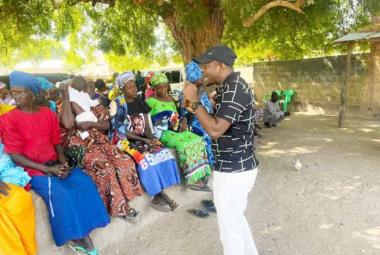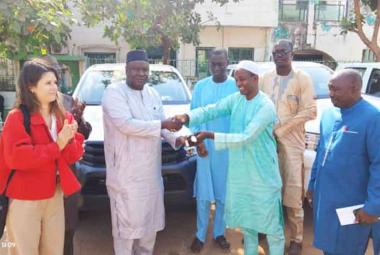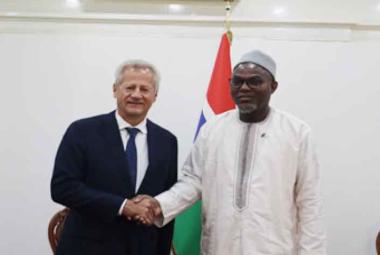By Zainab Jobarteh
Unlike many, who leave their home country with the sole aim of reaching Europe, Absa Jallow, 31, traveled to Nigeria in 2011 with the intention of going to school. While there, she lived with Gambians and worked as a cook. As many young people, Absa was ambitious and wanted more for herself and her family, her wish was to migrate to Europe through the ‘’backway’’. However, fate had other plans.
In 2013, she came across individuals who claimed to have jobs for her and some other Africans in Libya. What they did not know, however, was that these people were human traffickers and they were going to be sold in Libya.
‘’We did not know they were human traffickers until we arrived in Libya,’’ she said. ‘’When we arrived there, we were all locked up in a room and our buyers came for us in their taxis.’’
Absa explained that she refused to go with the person that purchased her, and that is how she ended up in prison. Absa was incarcerated thrice, three months, six months and two months respectively. Each time she was tortured, abused and felt unimaginable pain.
She finally met a Senegalese man, a Fula like her, who bought her ‘freedom’ and married her.
Asked whether her suffering ended after she got married, Absa responded; ‘‘it increased’’. Freed from the beatings and maltreatments of the prisons, Absa thought she would finally find peace with her husband. However, the events that happened after she left prison and married the man were the complete opposite of what she had envisaged.
She explained that she decided to get married because she was tired and thought it was the only thing that could have given her “at least five percent of freedom’’.
‘‘He knew I did not love him,’’ she said. ‘’After we got married, he revealed to me that he had two wives who are both in Senegal, and that I am the third one.’’
Many people believe that Lebanese and other Arabs are the perpetrators of these inhumane acts in Libya but for Absa, it was different. Absa lamented that all the abuse, torture and humiliation she went through was at the hands of black Africans like herself, she was sold by a black man and the abuse continued when she married another black man.
She narrated that she was always locked up in the room and had no keys. She got pregnant and the pregnancy lasted for one year two weeks, which she said was a mystery to the doctors.
Absa could not give birth so she was operated on. Unfortunately, ‘’the doctors mistakenly left some kind of metal in my stomach after the operation because there was chaos in the town I was in and bullets were coming through the hospital windows’’.
She explained that she finally came back to The Gambia with her four-month old baby in 2017 with the help of IOM.
Asked how she got back on her feet after her return, she responded; ‘’I was already strong and on my feet way before I came back home’’.
For someone who had gone through pain and maltreatment in a country she knew no one in, Absa said she had to be strong on her own and register with IOM to be returned voluntarily.
‘’The process of getting registered and coming back home requires strength. Knowing you are going home to your family with absolutely nothing is hard, but, I had no option but to be strong,’’ she said.
Even after her return which was facilitated by IOM, Absa said she lived in excruciating pain as a result of the object left in her stomach during the operation. Though she was not aware of the presence of metal in her stomach, she still decided to seek help from IOM and they facilitated for her to get tested.
Absa Jallow had a second operation in The Gambia and the metal was removed. She was given a reintegration support package by IOM and opened a grocery store. However, the business ran down quickly ‘’because of the dependency rate of family’’.
‘’I applied for a grant from the Youth Empowerment Project (YEP) and established a restaurant, which is still running,’’ she noted.
A graduate from Armitage High School and former secretary at Kombo Kerewan Upper Basic School, Absa said she would not have embarked on the journey if she knew then what she knows now.
She is also a volunteer of Migrant as Messengers and advocates against irregular migration in The Gambia.
Though still healing from the trauma and terrible experiences, Absa says her biggest concern now is how to get a divorce from the father of her son. She narrated that she is still finding it difficult to get a divorce because the man, who now lives in Senegal, has refused to show up in court.
‘‘The Cadi Court had asked me to present a witness, but where can I get that from?’’ she cried.
Stigmatized in society because she did not bring back anything but a child and lost friends and family, Absa expressed that she has no intention of undertaking the journey again. Her plan is to be successful in her business and happy with her family.







